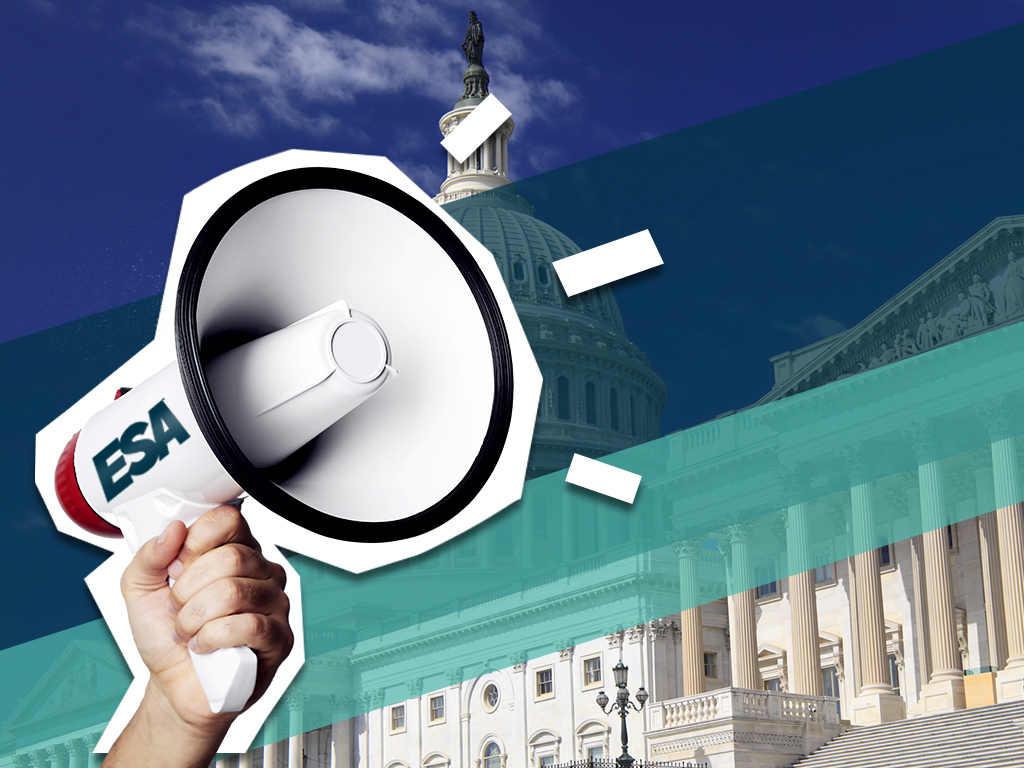ESA Advocacy in 2021 – Members Demonstrate the Power of Grassroots Action

By any measure, we can say that 2021 was a very important year for the electronic security and life safety industry when it comes to advocacy and collaboration. In the midst of widely varying COVID restrictions for the second year, the economy seemed to push through and make the most of a challenging year. But hurdles not related to the pandemic remained for this industry and here at ESA, we monitored, informed, and tracked hundreds of bills, regulations, and ordinances to keep members informed – and act when necessary.
By the Numbers
In 2021, ESA reviewed many thousands of bills and ultimately tagged 878 at the state and federal level for monitoring. Of these, 61 were considered ‘high priority’. Over 140 monitored bills were enacted into law across the country. Twenty percent (20%) of the enacted bills were supported by ESA and only 2% were actively opposed. Most enacted bills addressed business tax relief related to COVID, pandemic liability immunity (an important issue for businesses) and occupational licensing reciprocity.
Where the ‘Grassroots’ Rubber Hits the Road
2021 will be remembered for momentous efforts to protect the electronic security industry. We were in a defensive and offensive mode almost simultaneously in Maryland and Georgia. In addition, member companies and like-minded industries descended on the Houston City Council, which reversed its decision to eliminate the low-voltage exemption from electrical licensing. The effort in all of these jurisdictions were met with success and it was the effort of members who answered the call to write their elected officials that helped make the difference. It also took volunteer leaders like John Loud, LOUD Security (and ESA Chairman Elect) and Doug Bassett, Comcast XFINITY (National Company Director) who worked behind the scenes and publicly representing ESA and the electronic security industry, with great success.
In Maryland, we were faced with the creation of a statewide electrical licensing statute that would have placed all low-voltage, limited energy integrators under the jurisdiction of master electricians and their appointed board. This was a multi-year battle between electrical contractors and limited energy integrators. We were joined with industry groups like CEDIA, NSCA, BICSI and several national manufacturers and companies to protect limited energy circuits from electrical licensing. ESA submitted written testimony before the Senate as did many others with the same concerns. We ultimately ended up with an electrical licensing bill that passed but pushed the limited energy issue out for the next legislature to resolve.
In Georgia, the alarm industry was specifically targeted by the City of Sandy Springs, which decided alarm companies, not end-users, should pay the fines for false alarms. This ordinance was challenged in court, but that effort was not successful. The next obvious step was legislation that would preempt local governments from such ordinances, similar to legislation that currently exists in states like California, Texas, and Florida. This would be a monumental effort because Sandy Springs officials were highly connected and influential in the Georgia Legislature. There is not enough space here to describe all the hard work that was done at the grassroots level and by leadership with the Georgia Electronic Life Safety & Systems Association (GELSSA), Comcast, ADT, and by people such as John Loud. But at the end of the day, HB 465 became law.
The City of Houston was working on an ordinance to update its electrical code for several years. During this time, low-voltage integrators and companies tried to work with city staff to change the low-voltage exemption from 50 volts or below to comport more closely with Texas statute, which exempts Class 1, 2 and 3 circuits as defined by the National Electrical Code. By August we began hearing that the city council was actually considering eliminating the 50-volt exemption altogether and putting every limited energy integrator under the control of master electricians. This was the result of the considerable influence from electrical contractors who are threatened with power over ethernet (PoE) technology, in particular PoE that is used for lighting. ESA, working with the same limited energy industries as described above, put its particular influence on this issue to the forefront because we had more member companies (by a wide margin) than any other industry that would have been impacted by this ordinance. With that reality, we launched an advocacy campaign through our platform, and we engaged the Texas and Houston alarm associations, who followed suit by engaging their members and urging them to use our platform as well.
Leading to the pivotal November meetings, over 270 grassroots letters were delivered to Houston City Council members and more than a dozen business owners from the alarm and limited energy industry registered to testify before the council. Prior to the meeting, the Mayor and council made the decision to strike the language that would have eliminated the 50-volt exemption, keeping the status quo. But over a dozen advocates did speak, including Doug Bassett on behalf of ESA as National Company Director and Principal voting member on NEC Code Making Panel 03. Due to this strong presence at the council meeting and grassroots efforts the city council passed an amendment in the ordinance giving the Public Works Department 180 days to work with limited energy stakeholders and bring more workable exemption language to the council.
Vigilance for 2022
We do not know where or when the next grassroots effort will be needed or launched. We know more work is needed in Houston and Maryland, but we also know independent electrical contractors are not going away. Their scope of work is threatened by PoE and we fully expect the battle will continue in other cities and in state legislatures. We also do not know where the next Sandy Springs may be. But we do know ESA will be here, with your support, to protect your business and the electronic security industry.




